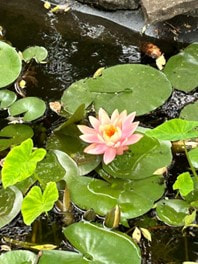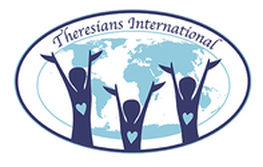Sunday Scripture - Reflection for June 9, 2024 Scripture Reflection: June 9, 2024 - Tenth Sunday in Ordinary Time Genesis 3:9-15 Psalm 130:1-2, 3-4, 5-6, 7-8 2 Corinthians 4:13-5:1 Mark 2:20-35 Three words came to mind during my reflection on this Sunday’s readings: Family, Disappointment and Abundance. The first family of Adam and Eve followed by the family of Joseph, Mary and Jesus. And my family from a societal point of view is composed of my immediate family as well as my extended biological family. However, I know I have other family members in my Theresian sisters, both in my community as well as nationally and internationally. These sisters support me in both the happy and sad times of my life. I wonder if Mary was disappointed when Jesus said, ‘Who are my mother and my brothers?” As a Mom myself, I think she was happy that Jesus had found a family in all those who were doing the will of God. Adam and Eve disappointed God by deciding they wanted to experience that specific “forbidden fruit” even as He had provided them with a garden that would provide them with everything they needed. I know, at times, I have disappointed my family and friends and it’s hard to ask for forgiveness. But it’s possible to reconcile, even when I realize my wrong and am hesitant to take the next step. I find that it is possible to reset the connection by asking for a friend’s/family member’s forgiveness. Just as it is with God. Sharon Staffel Anam Cara Community Houston, Texas
0 Comments
Invitation to Encounter ChristBy Tammy Townsend Denny, TI Executive Director
I would like to introduce you to a new podcast called “Skinny Thoughts on Christ’s Peace” hosted by Dr. timone davis (lowercase intentional). In the podcast, Dr. davis “invites you to lift your spirits with these sermons and meditations on Christ’s peace.” I have had the good fortune of studying with Dr. davis as part of my Master of Divinity coursework at Loyola University – Chicago. She is a powerful storyteller who will inspire you to encounter Christ in new and bold ways. I hope you enjoy her message as much as I do. Sunday Scripture - Reflection for June 2, 2024 Photo by Arnold Knoche Photo by Arnold Knoche The Solemnity of the Most Holy Body and Blood of Christ Exodus 24:3-8 Hebrews 9:11-15 On this solemn feast of the Most Holy Body and Blood of Christ, the first two readings are about blood. The Hebrew people saw blood as the life force of a person or animal. They would sacrifice animals and offer the blood, the life, of the animal back to the creator. In the first reading from the Book of Exodus, following the LORD’S ordinances, Moses took half the blood and splashed it on the altar. The other half was splashed on the people to signify the covenant the LORD made with his people. The people must have known the LORD was not like the other gods. These gods would have wanted all the sacrifice to themselves, but the LORD used their gift of blood and turned it into something to show the LORD’S love for the people and to help sanctify them. I bet the people thought it couldn’t get any better than that, but the LORD was preparing them for something much greater. The letter to the Hebrews tells us that the LORD himself became one of his people and with his own blood, through the Holy Spirit, became the offering and obtained eternal redemption for his people. We remember this (anamnesis) at every Mass, when Jesus tells us to take this chalice, the blood of the new covenant and drink. As Catholics today, we are fortunate to be able to receive the fullness of the sign of the Eucharist. We can take and eat and take and drink. Lynda Knoche Women at the Well Community Sugar Land, TX Sunday Scripture - Reflection for May 26, 2024 Sara with her family Sara with her family MY RELATIONSHIP WITH MY ADULT CHILDREN - A REFLECTION OF MY RELATIONSHIP WITH OUR TRINITARIAN GOD "... in the name of the Father, and of the Son, and of the Holy Spirit." (Matthew 28:19) I believe in a loving God. A God who is parent, sibling, and friend – Father, Son & Holy Spirit - rolled into one. In an imperfect way my relationship with my own adult children is a metaphor for my relationship with God. GOD THE PARENT. In my children’s life experience, I am the one who gave birth to them. When I held each one of them for the first time, I loved them completely. Like God, the parent, I rejoiced in their birth. I have been there holding them, caring for them, loving them, disciplining them, guiding them, listening to them, waiting for them to come home, delighting in time spent together. When they were children, my primary role was as mother. There were times when they were angry with me because I disciplined them. At times they came to me because they were hurt and needed a kiss or to climb into my lap for a hug and a quiet moment with my arms around them. When they accomplished something, they would shout out the name they called me, “MOM”, to make sure I saw them. As adults they still call me and need me as Mother. They will always be my children, but they are now adults and they don’t need a mother as much as a sister-in-Christ. GOD THE SIBLING. I believe that God has no grandchildren. Through our Baptism, we are sons and daughters of God. Therefore, when God grants us the privilege of having a child, we have the responsibility and honor of raising a "sibling" to be part of the Kingdom of God as a disciple of Jesus Christ. Consequently, when each of my children turned 18, I began to think of them and walk with them as a “sister-in-Christ.” I now conclude letters I write to them with “love, Mom, your sister-in-Christ”. Seeing those words written on paper helps me to also work on living it out in life. I am an older sister who has life experiences they can tap into. Often as adults, they need me as someone who will listen to them, care for them, talk through ideas, directions, and possibilities. They can turn to me as someone who has walked the walk, knows the feeling, and can relate to them. But then there are those times when my children call, they just need a trusted friend. GOD THE TRUSTED FRIEND. My good friends are those people I’ve laughed or cried with, and walked with through various adventures. They’re the people who know my good side but also challenge me, to be the best I can be. They are the ones I can sit with in silence admiring an amazing sunrise or contemplating the flames in a campfire. Even when I have not spoken to them for a while, I know they are there for me if needed just to listen or come over for a game night or assist in a project or situation. I am blessed with a husband whom I consider my best friend. Together we had the privilege of raising 4 children into adults with whom we now enjoy spending time. I love it when they call just to talk or ask to spend time with me, not as mom, but as a trusted friend. I love that we can accompany each other and challenge each other to be the best versions of ourselves as we walk together and make memories that solidify our friendship. Our Trinitarian God responds as we pray! My children calling on me as Mother or Older Sister or Trusted Friend, depending on the circumstance and their need, is an imperfect metaphor and reminder of how I can call upon God in my need. Reaching out, in prayer, to God the Father or God the Son or God the Holy Spirit. One God, present to us all, in three almighty ways. Sara Fontana Wildflowers Community League City, TX A Garden of Hope Image by Ekaterina Ershova from Pixabay Image by Ekaterina Ershova from Pixabay Last weekend, I planted our vegetable garden. For those in warmer climates, it might seem a little late to be planting, but in the Upper Midwest of the U.S., mid-to-late May is the earliest we can plant. As I tucked the delicate little plants into the dirt, I began to think about hope. There is a lot of hope in planting a garden. There is the hope that I will get more than a sore back from all the work. There is the hope that the rabbits won’t eat the green bean plants like they did last year. There is the hope that the sun and the soil come together in their divine dance to produce a bountiful crop of tomatoes, cucumbers, peas, green beans, onions, leeks, and lettuce. There is the hope for the garden-fresh dinners to come. But there is a deeper hope when I plant a garden. There is the hope that I will be here to harvest the vegetables. There is the hope that my home, my family, my life as I know it will be here when the tomatoes are at their most abundant. There is the hope of more days, weeks, and months to come. Though, there are no guarantees. We read in Hebrews 11:1: “Faith is the realization of what is hoped for and evidence of things not seen.” It is easy to lose our faith and our hope in a world of turmoil. It is easy to slip into a “woe is me” or “what’s the point” thinking. Why plant a garden if there is not hope for tomorrow? I prefer to believe that “whoever sows bountifully will also reap bountifully” (2 Corinthians 9:6). So, I keep tucking the little plants into the dirt with hope for tomorrow. Sunday Scripture - Reflection for May 19, 2024 Beth’s granddaughter and family after Confirmation Beth’s granddaughter and family after Confirmation Scripture Reflection: May 19, 2024 – Pentecost Sunday 1 Corinthians 12: 3b-7, 12-13 As a college student back in the late 60s and early 70s, I was introduced to the Catholic Charismatic Renewal Movement, a movement that sought to help Catholics be more fully aware of the gifts that were given to us at our Baptism and Confirmation. In this passage I am reminded that we are “given individual manifestations of the Spirit for some benefit.” That benefit is not for us, but rather for the care of the Body of Christ. I can’t help but think of Saint Mother Teresa who selflessly gave to the poor all the gifts given to her by Our Lord. We are taught that the eternal Love between the Father and the Son is the Holy Spirit. Since this is true, then it makes perfect sense that the greatest of all of God’s gifts is Love. This Easter Season has seen many of our Catholic youth receiving the sacrament of Confirmation. My prayer is that they, and we, daily place our gifts at the feet of Jesus to be used for the building up of His kingdom here on earth. Beth Eason S.I.S.T.E.R.S. Community Lake Charles, LA Sunday Scripture - Reflection for May 12, 2024 Photo by Heidi Clark Photo by Heidi Clark Gospel Reflection: May 12, 2023 - Seventh Sunday of Easter John 17:11b-19 “Consecrate them in the truth. Your word is truth.” Fr. Ron Rolheiser, OMI tells the story of a doctor going out to dinner with her spouse. They are sharing a lovely meal in a fine restaurant when suddenly, a few tables over, another patron clutches his chest and passes out. In that moment, even though the doctor and her spouse may be having an important conversation about their children, an upcoming getaway, or how to address the situation of a leak in their roof, by virtue of the Hippocratic Oath, she has been consecrated to drop everything and help the man who has passed out. In baptism, we are consecrated, too, and this Gospel passage reminds us that it’s God’s truth we are set aside to personify. Early on in our Christian journeys, we learn that God is love. So, how do you personify love? When you wake up in the middle of the night to feed a hungry baby. When you buy lunch for the unhoused person sitting on the curb outside the gas station. And when you spend time caring for an elderly parent. My husband has a morning ritual that reminds him of his “consecration.” As he puts his wallet in his pocket, places his wedding ring on his left hand, and grabs his keys, he reminds himself that he has been set aside to care for his wife and family, provide for them through his job, and to keep our home safe. What are you consecrated for, and do you recognize it as living out God’s truth? Heidi Clark Wildflowers Community Houston, TX Gathering By Tammy Townsend Denny, TI Executive Director Have you registered for the Gathering in Houston? The deadline is approaching quickly! (Scroll down for the link to register). The Gathering Committee has worked diligently for many months to create an exciting weekend for you, featuring speakers Robin Hebert, Sister Francis Bisland, COS, and Sister Sarah Simmons, CSJ. To hear one of our speakers, consider listening to “What Sisters Read” on the podcast Beyond The Habit. In this April 9 episode, Sister Sarah Simmons talks with Sister Erin McDonald and Sister Colleen Gibson about her favorite books. My guess is that some of her favorites might be your favorites, too! Click here to listen. Please remember that financial assistance is available for the Gathering. Through the generosity of the Theresian Foundation and individual Theresian benefactors, a limited number of reduced registration fees of $125 are available. Simply complete the online registration form and check the box that says you would like financial assistance. Sunday Scripture: Reflection for May 5, 2024 Photo by Cindy Fontenot Photo by Cindy Fontenot Gospel Reading Sixth Sunday of Easter John 15:9-17 Such a beautiful and powerful reading this Sunday! God instructs us to remain in His love. We did not choose Him, but He chose us. I want to love God, but by loving Him, I must also love my neighbors. I do love them, but boy, am I quick to judge them. I try to forgive them, but I also find myself getting angry at them again and again. A harsh word is exchanged, and I ignore them; I only criticize them - like I am perfect... It’s so easy to say love the Father, but loving others, even in the Father’s name, can be tough! I am so grateful that He loves us, and Jesus, I am trying to love others without judgment, but boy, do I need your help in this department! Cindy Fontenot Women of Hope Community Lafayette, LA Sunday Scripture: Reflection for April 28, 2024 Photo from www.gospelimages.com Photo from www.gospelimages.com Scripture Reflection: April 28, 2024 - Fifth Sunday of Easter John 15:1-8 Jesus used many metaphors from nature in His teachings. In today’s Gospel, St. John recalls Jesus’s teaching His disciples that “I am the vine, you are the branches.” Remaining connected to the vine and being pruned to bear fruit would have been easily understood by the agrarian communities of the time. This gospel passage reminded me of Psalm 1 from the Old Testament, which also used nature imagery. The basic message is simple: remain connected to God to prosper and bear fruit. Reflection on Psalm 1, verse 3 He is like a tree planted near running water That yields its fruit in due season, and whose leaves never fade. Lord, plant me like a tree near your Living Water that I may prosper and grow strong. As a tree grows green and leafy, budding forth with the promise of fruit, grow me in faith and love and fruitfulness. Prune my errant branches, fertilize my soul and spirit, let me drink of Your essence. Anne Broussard Esprit de L'ame Lafayette, LA |
Archives
July 2024
Categories
All
|
 RSS Feed
RSS Feed
